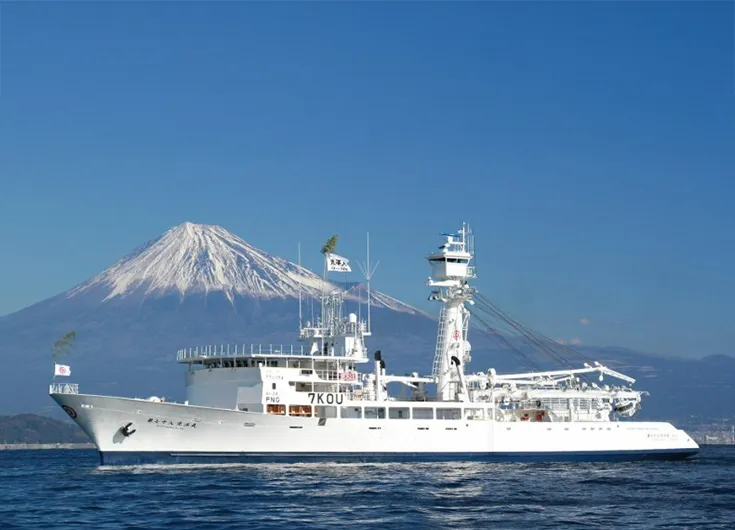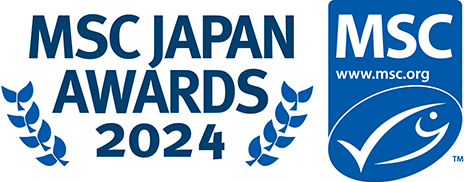The Nissui Group aims to preserve the bountiful sea and improve the sustainability of marine resources. One way in which we aim to do that is by acquiring ASC and MSC certification, and by using marine products that have marine eco-label certification.
Seafood certification programs such as MSC determine their criteria on the basis of the “Code of Conduct for Responsible Fisheries” and the “Guidelines for the Ecolabelling of Fish and Fishery Products from Marine Capture Fisheries” of the Food and Agriculture Organization of the United Nations (FAO) but with the widespread acceptance of the concept of sustainable seafood, the number of certification programs has multiplied and it has become necessary to ascertain the value of such certifications. Consequently, the GSSI (Global Sustainable Seafood Initiative), a third-party benchmarking agency to verify that certification programs meet FAO guidelines, was established. GSSI is an international partnership that verifies programs assessing the sustainability of marine products.
In April 2017, Nissui became the first Japanese company to become a Funding Partner which promotes global resource sustainability. As of March 2023, six companies of the Nissui Group are registered as Funding Partners. As a company engaged in the marine products business, Nissui Group will address the issue of sustainable use of marine resources, as well as contribute to the realization of responsible fishery.
Participation in External Initiatives
![[Logo] GSSI](/assets/img/site/170/170_42_img-01.png)
MSC certification is a certification program operated by the Marine Stewardship Council (MSC) for sustainable fisheries in which fish are caught by protecting marine nature and resources, and is one of the most prominent marine eco-labels. Marine products caught by MSC-certified fisheries are internationally traceable, which translates into appropriate marine resource management. MSC certification is recognized for its trustworthiness and rigorousness and is approved by the Global Sustainable Seafood Initiative (GSSI). The Nissui Group has acquired MSC certification for multiple fishing grounds and species, including Alaska Pollock.

MSC-C-51733
Merluccius australis (Chile Austral hake) bottom trawl and midwater trawl fishery/longline fishery operated in Chile Fishing Areas X, XI and XII by Empresa de Desarrollo Pesquero de Chile S.A. (EMDEPES) (Chile)—a Nissui Group company—and three other companies acquired MSC certification (Fisheries Certification Requirements (FCR) version 2.0) on September 24, 2019. In June 2020, EMDEPES acquired CoC certification (Note) for its vessel "UNIONSUR" as well as its logistics facilities. EMDEPES produces mainly H&G (Headed and gutted) and filleted Merluccius australis, etc. and sells them primarily to the Spanish market. Having acquired CoC certification, EMDEPES will be able to produce and sell them as MSC-certified products.
(Note) Chain of Custody (CoC) certification: This is a certification managed and operated by the Marine Stewardship Council (MSC) with respect to the management of processing and distribution processes (i.e., Chain of Custody). It certifies that its certified seafood has been managed appropriately, has not been contaminated with non-certified ingredients and is free from mislabeling throughout all processes of production, processing and distribution of the products.
On February 15, 2024, Kyowa Fishery Co., Ltd., a Nissui Group company, in collaboration with another partner company, became the first Japanese-flagged purse seine fishing operation to achieve MSC (Marine Stewardship Council) certification for their skipjack tuna and yellowfin tuna fishery in the central western Pacific.

The “MSC Japan Award" was newly established in 2024 to recognize businesses that have contributed to the promotion of MSC-certified marine products in Japan. Award recipients were determined based on the previous year’s sales volume of MSC-labeled products for consumers, and Nissui was honored with the award in the manufacturer category for two consecutive years, 2024 and 2025.

ASC certification, which is operated by the Aquaculture Stewardship Council (ASC), is a certification scheme to certify that aquaculture business is operated by sustainable methods and its seafood is "responsibly farmed seafood" in which consideration has been given to the surrounding natural environment and local communities. This certification scheme is one of the social mechanisms for alleviating the environmental impact of aquaculture itself while complementing the sustainable use of natural resources, and for supporting the daily lives of people in the local communities engaged in aquaculture business that gives consideration to them.
![[Logo] ASC](/assets/img/site/170/170_40-img-03.svg)
ASC-C-01759
Kurose Suisan Co., Ltd., a Nissui Group company, became the first in the world to acquire ASC certification for its Japanese amberjack on December 16, 2017, and acquired Chain of Custody (CoC) certification (Note) for its processing plant on November 30, 2017. Kurose Suisan is one of the largest operators of Japanese amberjack aquaculture in Japan, and its "Kurose Buri" brand is distinctive for its firm flesh. Kurose Suisan provides a stable supply of fatty, high-quality Japanese amberjack throughout the year, thanks to Nissui Group's aquaculture technology.
Salmones Antártica S.A. (“SA”) (Chile), a Nissui Group company, acquired ASC certification for its salmon/trout on March 5, 2019, and received Chain of Custody (CoC) certification (Note) for its processing plant on its head office's premises on March 4, 2019. Salmon/trout and coho salmon handled by SA, which are distributed to markets worldwide through Nissui Group's sales networks, have become familiar among consumers as the "FIVE STAR" brand.
As of the end of March 2025, SA has obtained ASC certification for 100% of its production volume.
(Note) Chain of Custody (CoC) certification: This is a certification managed and operated by the Marine Stewardship Council (MSC) with respect to the management of processing and distribution processes (i.e., Chain of Custody). It certifies that its certified seafood has been managed appropriately, has not been contaminated with non-certified ingredients and is free from mislabeling throughout all processes of production, processing and distribution of the products.
Best Aquaculture Practices (BAP) certification, the operation of which was launched by nonprofit organization Global Aquaculture Alliance (GAA) in 2002, is a third-party certification program which certifies that consideration has been given to the environment, social responsibility and animal welfare and food safety has been ensured in each stage of the aquaculture supply chain, i.e., hatchery, feed mill, farm and processing plant. BAP certification is distinctive in that it certifies the aquaculture supply chain on a process-by-process basis; the four respective processes of the hatchery, feed mill, farm and processing plant are subject to certification on an individual basis, and the number of "stars" on the BAP label represents the combination of the certified processes.
Salmones Antártica S.A. (“SA”) (Chile), a Nissui Group company, acquired BAP certification for its feed mill (Los Ángeles, Bio Bio Region) in August 2018, processing plant (Isla de Chiloé, Los Lagos Region) in January 2019, seawater aquaculture farm (Bahia Acantilada Sector 1, Aisen Region) in March 2019, and fresh-water aquaculture farm (Los Tambores fresh-water aquaculture farm in La Union, Los Rios Region) in August 2019. Having been certified for all four processes (i.e., hatchery (fresh-water aquaculture farm), seawater aquaculture farm, feed mill, and processing plant), SA acquired "4-star," the highest level of BAP certification.
MEL is a certification scheme to promote the initiatives by producers who proactively engage in sustainable use of marine resources and activities to protect the ecosystem, as well as the initiatives of processors and distributors who proactively handle the marine products of such producers; and to ensure the transparency of the handling of marine products at each stage including fishery, aquaculture, processing and distribution and to contribute to the selection by and the gaining of trust of related operators and consumers. This scheme is operated by Marine Eco-Label Japan, which was launched in December 2016, with three types of MEL certification: (1) Fisheries certification, (2) Aquaculture certification and (3) Chain of Custody (CoC) certification.
In 2019, “MEL,” was recognized by the GSSI (Global Sustainable Seafood Initiative), a benchmarking agency for international marine eco-labels, marking the first time an Asian marine eco-label scheme has received recognition. Marine eco-labels recognized by GSSI (e.g. MSC and ASC) are, in effect, international standards, that are adopted as procurement standards by the world’s major retailers. The Nissui Group promotes the acquisition of MEL certification.
![[Logo] MEL](/assets/img/site/170/170_230_img-01.svg)
JFRCA
20C3600081
To enhance the sustainability of marine resources, the Nissui Group is making efforts to acquire and spread marine eco-labels.
| 2022 | 2023 | 2024 | ||||
|---|---|---|---|---|---|---|
| Name of certification | Number of products | Total sales volume (tons/year) |
Number of products | Total sales volume (tons/year) |
Number of products | Total sales volume (tons/year) |
| MSC (Note 1) | 42 | 6,725.4 | 44 | 6,581.4 | 50 | 6,026.6 |
| ASC (Note 2) | 8 | 77.9 | 7 | 56.1 | 7 | 50.3 |
| MEL (Note 2) | 12 | 3,603.3 | 13 | 6,114.7 | 13 | 5,380.7 |
(Note 1): Scope of data: Products for which applications were made by Nissui Corporation.
(Note 2): Scope of data: Products for which applications were made by Nissui Corporation and its Japanese Group companies.